#huaguo shan
Text
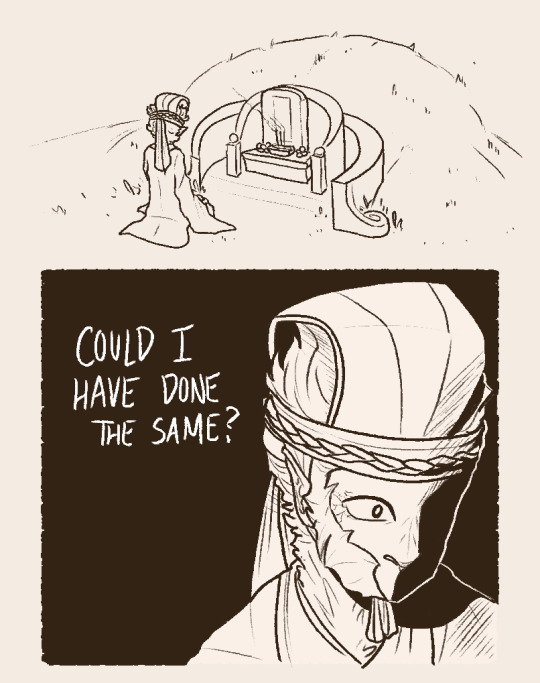
how fucked up would you be if you were told the embodiment of the worst parts of you was capable of killing members of your family
[ID: A sketchy two panel sepia comic. In the first panel, Sun Wukong is dressed in traditional deep mourning garb and kneeling before a grave, back to the viewer. The second panel is a close-up on his face. He has a hollow, terrified wide-eyed expression and half of his face is in deep shadow. He thinks, "Could I have done the same?" End ID]
#my art#journey to the west#jttw#xiyouji#sun wukong#monkey king#so. Six-Eared Macaque thoughts.#i think that in addition to simply being the worst parts of SWK (ie the actual parts of him that are flawed and bad)-#-he's also the worst of what SWK thinks of himself#cuz six-eared cannibalizing members of huaguo shan is good for hammering in how evil he is#but even for the 'worst parts' of swk i think swk doing anything like that is wildly ooc#so.... i think six-eared also embodies swk's intrusive thoughts#(intrusive thoughts as in actual violent reprehensible thoughts swk would never follow through on bc thats what intrusive thoughts are-#-not the tiktok misuse of the term 🙃)#so imagine how fucked up youd be if someone said This was the personfication of the worst parts of you and not clarifying*#* so youre just like. 'oh so my intrusive thoughts are right then' *#*'so they are actually a part of me and im a horrible person'#god the pilgrimage gave swk so much more trauma than ppl give credit </3#sorry this is messy and sketchy i just wanted to get these ideas down gfdhjskd
599 notes
·
View notes
Text
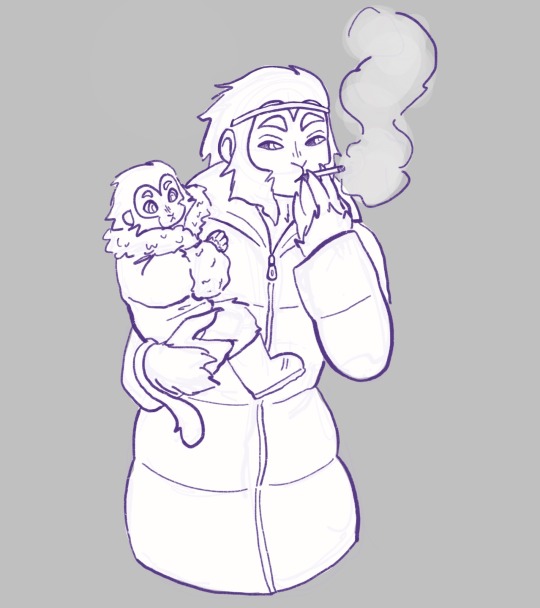

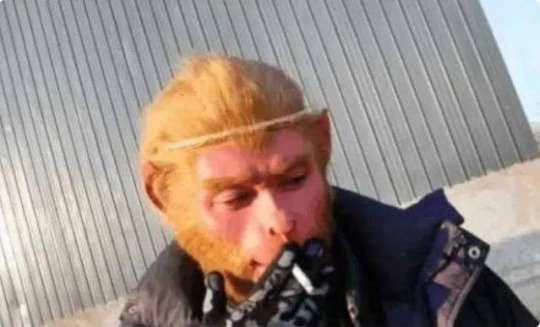
Someone said these two looked similar, so I had to draw them together
#day trip to IKEA#Wukong taking a smoke break is one of my fav kinds of images#ft. littol baby monkey from Huaguo Shan#sun wukong#jttw#meme redraw??#meme combination perhaps#might disappear until finals are over after this🫡#my art#shit posting my beloved
229 notes
·
View notes
Note
Hi I just wanna scream about the parallels between Macaque's revival and the fic about him teaching LBD what a phone is-
!!!!! THE WAY HE'S CONVINCED HE JUST NEEDS TO BE PATIENT AND UNDERSTAND AND WILLING WITH HER BECAUSE THAT'S HOW SHE WAS WITH HIM
IT HURTS SEEING WHO SHE WAS BEFORE AND THEN SEEING A SMALL SLIVER OF IT AFTER THE MUSIC STARTS PLAYING AND AAAAAAAAAAAAAAAAAAA/POS
I'll be honest, I got why Macaque was the way he was with here, but there was always this underlying frustration of kinda just wanting him to give up on her when it gets so bad he stops fighting back.
But then reading his revival? I sorta get it better now. And oh boy seeing them happy in the past feels even more bittersweet and it's amazing
THE REVIVAL FIC UNFORTUNATELY ISNT CANON TO THE ACTUAL FT AU BUT ITS RATHER FOR THE SPIN OFF THINGY WHERE THE TWO OF THEM END UP BEING ABLE TO TRAVEL THE EURASIAN CONTINENT TOGETHER INSTEAD OF JUST SIX EAR SOLO CUZ WHILE IN THE SPIN OFF BAIGU NEVER GETS KILLED, IN CANON!FT SHE DOES N SHE ISNT ABLE TO GIVE SIX EAR THIS KIND OF REVIVAL SINCE SHE IS ALREADY TRAPPED IN THE BOX WAY BEFORE HE EVEN DIES N SO THE FAKE MAYOR DOES IT (whos a piece of her skull that came to life in ft) BUT LIKE!!!!!!!!!!!!!! THE SPIN OFF REALLY JUST BUILDS FROM WHAT THEY HAVE GOING ON FOR LIKE... 250 YEARS BEFORE THE JOURNEY EVEN STARTS N /THAT/ IS CANON TO FT SO IM STILL WAAAAGHHGHRHRHG BASICALLY IF SHE COULD SHE WOULD 100%
i aint gon lie this ask made me smile so widely n i couldnt stop Both smilin n stimmin while readin it AND writin this reply therefoRE THANK YOU FOR NOTICIN THIS KINDA KUSH!!!! IT MAKES ME INCREDIBLY HAPPY!!!!!!!!!!!!!!!! <3
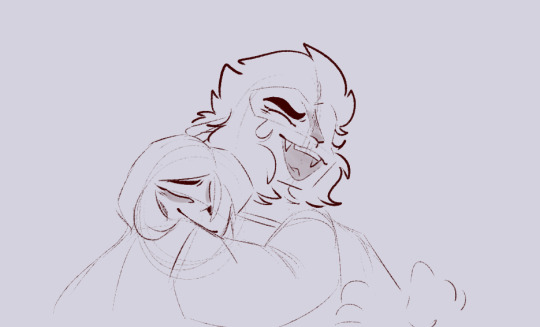
#Spot says stuff#lmk#fruit twins au#they just!!!! dont particularly like the idea of giving up on each other under any circumstance.. number one objective for em when it-#-comes to each other is to be there to help. baigu was one of the five people that made the huaguo shan famine easier to deal with for Six!#if you dont wanna count family members- she was actually the only one who wasnt ever directly exposed to the sufferin back on huaguo but-#-that didnt stop her from bein one of the biggest helps during that time. she used to be great man.....
41 notes
·
View notes
Note
i think it's cute how (to my knowledge) zbj is the only one of the pilgrims who has a spinoff story where swk erases his name from the death ledgers :> i think it pairs well with the semi-common post-canon narrative of zbj going to live on huaguo shan. it's like he's really part of the family now ❤️ (story is 十八罗汉斗悟空:孙悟空两情猪八戒)
I've never heard of this story before but WUKONG starting shit just cause the Arhots were getting more attention PLEASE!
He just drags Bajie with him XD
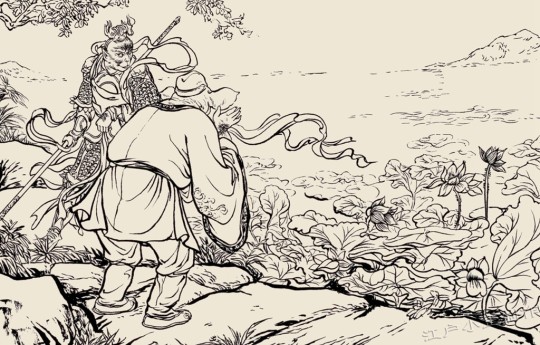
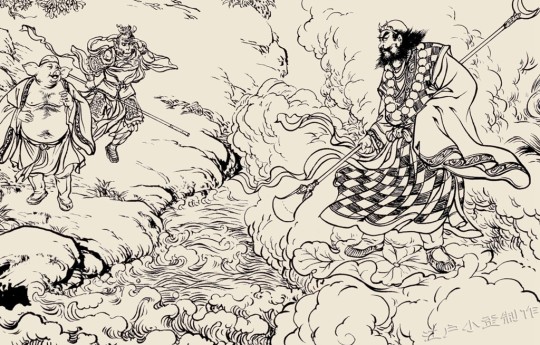
I love they immediately go to get Wujing to come help but hate that it was all a trap because this imagine is so cute of the three of them just hanging out.
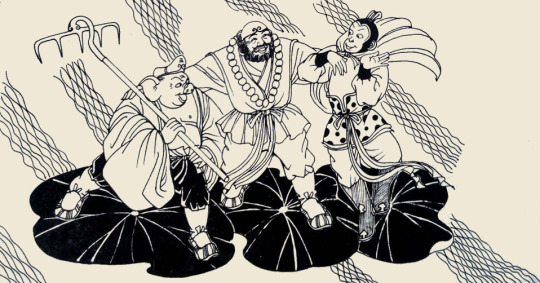
THEY ARE SO SWEET TOGETHER! I love stories where after the journey they are still such close friends/family. Drop of a hat would just join each other to beat up some guys no questions asked. But boooo this guy turns out to be the Arhat after their butts.
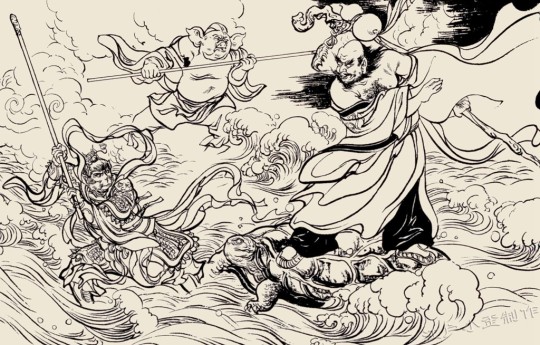
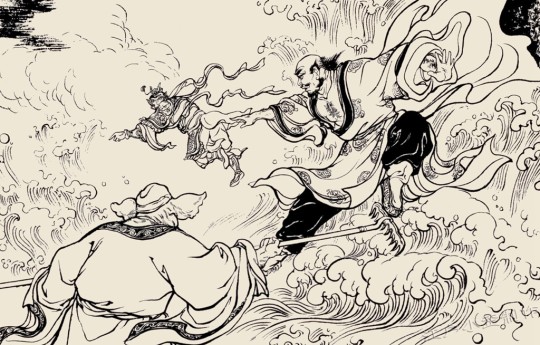

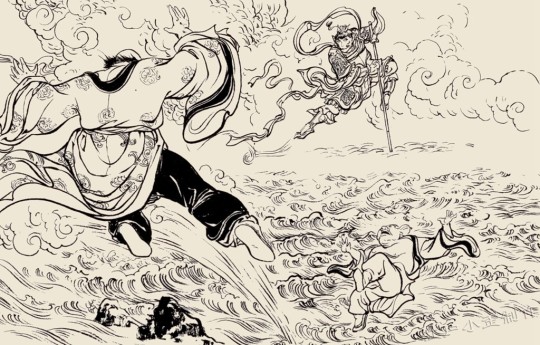
But still a lot of great moments of Bajie and Wukong fighting together! Do love that they still continue the trend that Wukong has trouble fighting under water and him asking Bajie for that help makes a lot of sense with him used to be the Marshall of the Heavenly Reeds.
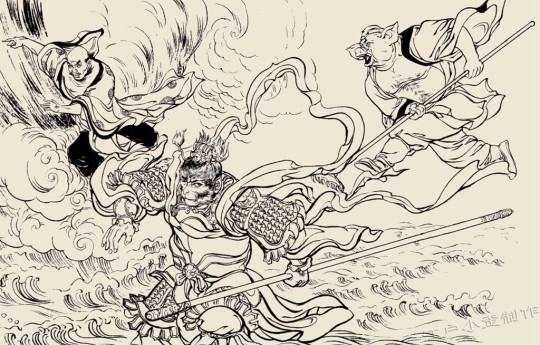
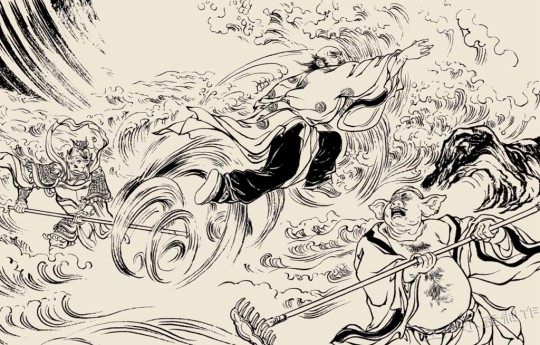
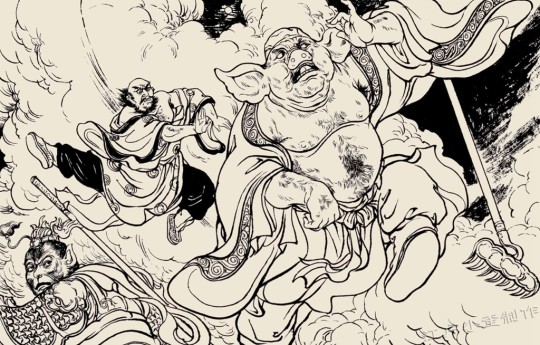
But still Bajie isn't nearly as immune to elements nor has the same stamina as Wukong does, making him tire out quickly and being more prone to magical attacks.
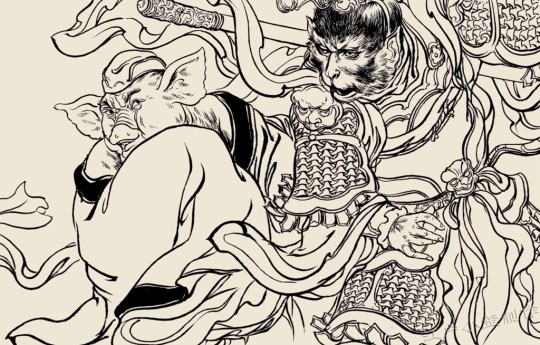
八戒想了想,道:“我倒是想起早年学过一门八面玲珑功,此功虚头巴脑,对敌全然无用,但今天正用得上,他无影无相,我只求滴水不漏,或许可以破他这路拳。”
说罢他强打精神,分出七个分身,“推窗望月,蛟龙出水,猛虎下山,回首掏……”招式纷繁复杂,虽然没有半分实力,却十分好看。
悟空笑道:“倒也不负这名,果然八面玲珑,世人皆喜这套,纵使无半分力气,却可立于不败之地也。”
Wukong! Is that a genuine compliment?! I never thought I would see the day! I bet that his moves were beautiful!

This is my first time seeing Bajie with his own clones so that is pretty neat to witness in another story.

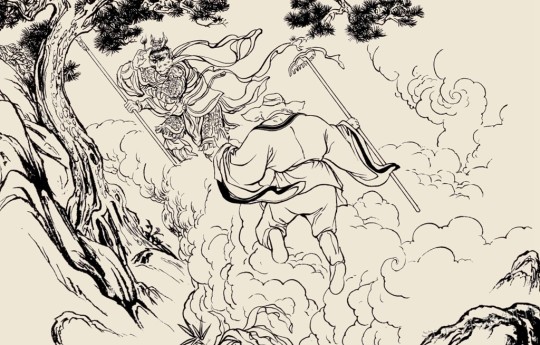
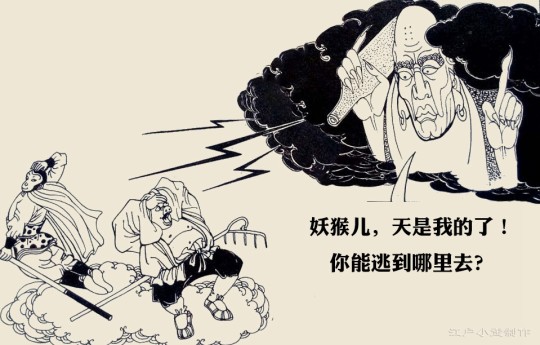
I'm SCREAMING at this page please! Look at Wukong! He has no regrets!

<3
此刻他以闪电瓶轰击,有制高点优势,已立于不败之地。悟空不怕闪电,但八戒这边就苦了,趴下找路逃命,裤子被炸得稀烂,如芒刺在股,无力再战。
八戒趴在地上,听雷声渐渐小了,仰起头一看,一座巨型金塔正凌空劈来,悟空眼疾手快一把把八戒推开,这才没被罩入塔内。
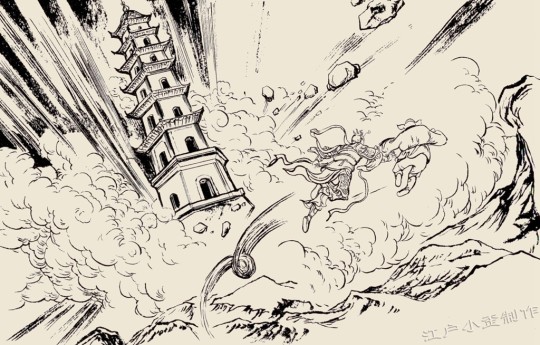
Wukong is such a homie, he knows that Bajie doesn't have the same immunities as him and even pushes him out of the way when he is prone.

八戒虽然惧怕罗汉法宝,但他就盯住过江罗汉,俩人正是对手,拳来耙去,直斗得愁云惨雾,日头偏西。
But also good on Bajie for not backing down either! He is clearly scared and feels outmatched but he refuses to back down. Love that about him, always a coward but he ain't a doormat.
体高罗汉见过江罗汉无法取胜,就拿闪电瓶对准八戒,一连串闪电直刺过来,八戒吓得一哆嗦,压低云头,躲到了流沙河中,找到一片荷叶,把鼻子埋了进去。
这边悟空不再需要顾忌八戒,金箍棒变大变粗,将方寸山棍法解数全部丢出来,形成一张紧密的棍网。虽然被围在核心,他还是哈哈大笑:“任你们罗汉花招再多,谁也进不了俺的棍网!”
Also that even when Bajie does go to hide in the river Wukong sees this as more advantageous than anything as he can finally go all out. He was holding back cause Bajie was in his line of fire but now he is out of friendly-fire range he can do maximum damage without worry!
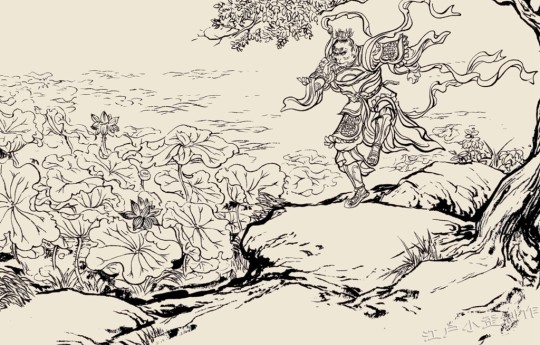
悟空战退了四罗汉,再来寻八戒,发现八戒已不在荷花池,连连高叫无人回应。
不知八戒吉凶如何?请看下回分解。
Is Bajie okay? I can't tell in the end if he was passed out or he scampered off completely.... I hope he is okay...
But still this was a great story! Thank you so much for recommending me this I had such a great read! I love seeing stories where the pilgrims still get together and get into trouble at times! Especially when it is still very in character and so much fun!
If someone can tell if Bajie okay thought :'-) please I have to know!
#anon ask#anonymous#anon#jttw#sun wukong#journey to the west#xiyouji#ask#zhu bajie#zhuhou#for my heart#at least to me
29 notes
·
View notes
Note
i love being a zbj apologist but sometimes the takes i see on the chinese internet are wild lol once i saw someone say that "zbj actually realized huaguoshan was in danger bc of his marshal tianpeng abilities and he got swk banished on purpose bc otherwise swk wouldnt have a chance to check up on huaguo and the monkeys wouldve been hunted to extinction if he hadnt come back soon enough so technically zbj saved huaguo shan" LIKE i love 4d chess but i think thats giving zbj too much credit 💀
You know I've only absorbed some information about the recent levels of Zhu Bajie love (and apologism lol) going on in China by proxy, but I'm still both surprised and usually delighted/amused to hear the levels to which this monstrous pig yaoguai is being turned into everyone's pookie bear. Though in this case a lot of my personal fondness for this trend is partially because, as far as I know, said apologism doesn't seem to involve dissing the other pilgrims haha. And while I do have to agree with you anon about how this 4D chess move does seem a BIT of a reach, one of the things I would LOVE to see in a Xiyouji rewrite would be more done to take Zhu Bajie out of the role of the slapstick clown of the group and do more to complicate his character both because of his former role as Marshal Tianpeng & all the skill that suggests and also because it would give him more opportunity for heartfelt moments between him and the other pilgrims. Said as much elsewhere, but I am for example fully on team "ZBJ hated the pilgrimage and the other pilgrims at first but over time he came to genuinely love them and his complaining became less about his own desires and more about wanting these stubborn idiots to take a much needed rest themselves" <3.
Also. Ough. I feel like a conversation between Sun Wukong and Zhu Bajie regarding how the former's banishment from the pilgrimage through the machinations of the latter did technically give him the chance to save the last of the Huaguoshan monkeys would make for a JUICY fanfic.
#anon answered#zhu bajie#zhu wuneng#sun wukong#monkey king#journey to the west#jttw#xiyouji#hmmm might have to try that idea out myself...#but anyway yeah it is pretty neat and pretty funny to hear about the pookification of zbj
18 notes
·
View notes
Note
I found your Twin Kings AU and I'm wondering does it change anything in the show ? Will Macaque appear early in the the show , will their be some changes ? Sorry I'm just really interested in this au
Tbh I call it an AU, but it is more of a headcanon that Macaque ain't part of the HuaGuo Shan like everyone put it out to be.
See here, Macaque is a fallen King who had his own domain, he left the way SWK did, but it was out of selfish reason, he never came back for his people.
I play around with the concept of He is the exact opposite of who SWK is as a King. He was not a loving King like SWK was, He Was feared instead,
Also I know that one of the Sworn Brothers SWK Had was a Female Macaque King, but in this AU it was Him instead,
So far this is what I've been doing with it
9 notes
·
View notes
Text
headcanons for Wukong’s generals and what duties they have:
- Ma - keeping order in the population, making sure all monkeys get to eat in the right order, stays to defend the cave if the others are on the military campaign, is in charge of appointing the leader of macaque faction in case of king’s demise, picking up replacement for general Liu in case of his death, also has power to demote Liu if she deems him unfit for whatever reason (it’s macaque politics, baby!). In case of Ma’s death youngest daughter will inherit the position as per ancient macaque customs. Decides which of the four generals takes the principal position in case of king’s absence. Recommends candidates for officers (although other generals can do it as well).
- Liu - scouting for the feeding grounds as well as during military campaign, vanguard, first line of attack/ defence during war, main command of the army in case of kings absence. Appoints officers if the king is not available (but he can only do so with Ma’s consent)
Liu and Ma represent all the macaques during king’s council, the most numerous species among Handsome Monkey King’s subject
- Beng - lookout, signalling danger, sounding alarm, gathering intel, announcing newly arrivals (of course he delegates other monkeys and gibbons to those tasks, it’s not like he does it all of his own)
- Ba - communication - relying orders from the king, co-ordination, organising the camp during military campaigns, organizing medical care
It is agreed that if either Beng or Ba dies and Wukong is unavailable, the other will pick the successors before steeping down (if both die at the same time Liu and Ma will pick the successors)
Beng and Ba speak for all non-macaque during king’s council unless representative of other species are invited (langurs and snubbed nosed monkeys), gibbons are the smallest group, but they are highly respected and well informed, they also tend not to amass power for themselves. Usually during peaceful times a highly respected pair of both snubbed nosed monkeys and langurs are invited.
If a monkey from the outside arrives at Flower fruit mountain, they are seen by Beng and they are introduced to either Ma in case of macaques or Ba in case of all the other monkeys. Then Ma or Ba assign their position, meaning that they can keep the new monkey in their command and give them job or send to other generals.
The generals also arbitrate in case of conflicts, depending on the case all or just some of them may participate in making the ruling depends on the case. Liu and Ma rule in cases involving macaques, Beng and Ba in cases involving non-macaques. Often other highly respected monkeys are invited to participate in the ruling. Ma has the decisive voice if they are evenly split in the opinion and the king is not available.
and a sketch for a drawing that I maybe finish one day
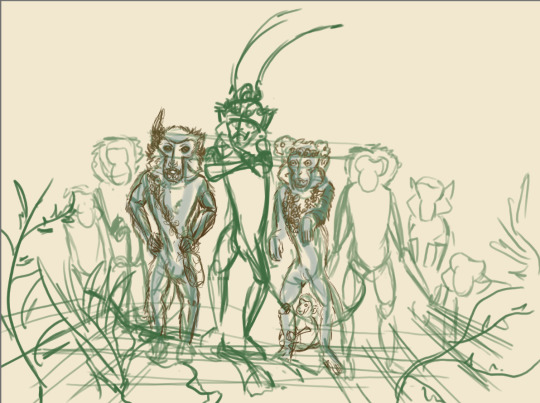
#journey to the west#headcanons#liu jttw#ma jjtw#beng jttw#ba jttw#jttw#sun wukong#monkey king#flowerfruit mountain#huaguo shan
21 notes
·
View notes
Text
BRO SUN WUKONG IS HERE
#WHEN MK WOKE UP ON HUAGUO SHAN#BROOOOOOOOO#OK YKNOW WHAT THIS SHOW IS ACTUALLY GOOD#not a huge fan of his voice actor but like. i can overlook that i rlly like the design they gave him#mk tag
2 notes
·
View notes
Text
I’ll probably post the new chapter tomorrow! That being said, here’s a preview bc I like this scene XD
“Ugh! He treats me like a child!” Wukong flung himself onto the makeshift throne, dangling his legs over one arm, head propped on the other. He let out a dramatic sigh, closing his eyes.
“Maybe if you stopped acting like one,” Ma came over and leaned on the back of the stone chair, elbows under her chin. “My King.”
“Oh, not you too.”
“Well, you’ve always valued my honesty.”
Wukong glared up at her. “Did I? Bah, never mind.” He pulled out the Jingu Bang and twirled it in his palm unthinkingly. “It’s like it doesn’t matter what I do. He still expects something from me.” He sat up suddenly, staff leaning on his elbow, and held up his fingers. “Immortality? Check that off the list. Huaguo Shan’s defenses are better than ever, thanks to me. We have alliances from thousands of li away, ready to come to our aid if I ever need them to. We’re the highest we’ve ever been, not just for demons, for any Earth dwelling creatures. Hell, he gets to wear clothes now.”
“Yes,” Ma remarked, her voice flat, “you did do all that.”
#jttw#sun wukong#journey to the west#my writing#i feel like this scene sums up nicely the status quo of this chapter#jazz hands
19 notes
·
View notes
Photo
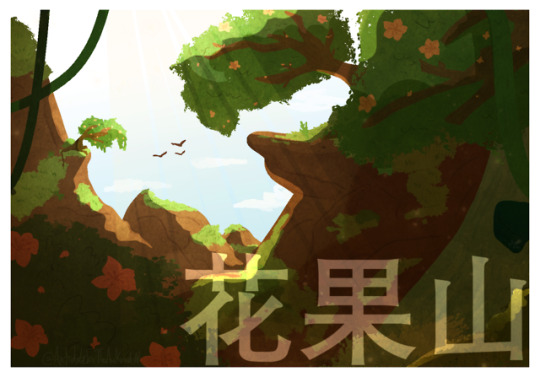
“So what’s it like back home?”
#my art#journey to the west#jttw#xiyouji#background#illustration#mountains#flower fruit mountain#huaguo shan#花果山#this was!!!! a one hour practice!!!! and im v proud of that!!!!!#I used to hate drawing backgrounds!!! but now!!! I think ive maybe got the hang of it!!!!#postcard#reblog don't repost#still working on the video fsdfdds
52 notes
·
View notes
Text
Story Idea: The Ape Immortals - The Origins of Sun Wukong
The following story sketch was originally posted on my external blog on the Historum website. The site recently switched to a new server but the blogs have yet to be migrated. I’m posting it here for posterity. Regular articles will resume after this entry.
As a lover of Chinese mythology and a former primatology major, I've always wanted to create my own primate-based character similar to Sun Wukong. I originally wanted him to be the son of Monkey or the son of one of his advisers or allies during his days as a demon. Either way, I thought he could train under Sun and gain similar powers. But then I decided that I wanted him to be a more civilized, yet more powerful version of the character; someone who is held in high regard by all beings of the six realms (demons, hungry ghosts, animals, humans, asuras, and devas) of Buddhist cosmology, as well as the Buddha himself. After reading about the ancient Chinese view of the gibbon, [1] a small, long-armed, arboreal ape native to Asia (fig. 1), I thought the character could be an ape immortal. It was only recently that I decided to pair him with a female since gibbons generally mate for life.

Fig. 1 - A gibbon soaring through the treetops. A larger version can be found here.
A rough sketch of the story is presented below. The tale is meant to be a standalone story, but it includes details that explain the origin of Monkey and how his life parallels his spiritual parentage. I’ve drawn upon traditional Chinese religious and vernacular texts for inspiration. The notes contain important information on the texts I used and why particular plot choices were made.
The Dao (道, the way) gives birth to the One (yiqi, 一氣, the first breath);
The One gives birth to the Two (yin and yang, 陰陽);
The Two gives birth to the Three (San qing, 三清, the Three Pure Ones);
The Three gives birth to the Ten Thousand Things.
The Ten Thousand Things carry the Yin and enfold the Yang;
Kneading gently, they create harmony. [2]
In the beginning of the universe, the Three Pure Ones, the manifestations of the Dao, use the vital energies of the cosmos to create heaven, earth, and all living things. Among the first to be created are two gibbons, a male and a female (fig. 2). They become the progenitors of all apes and monkeys, just like the phoenix and his mate, the next to be created, are the progenitors of all birds. Being embodiments of yin and yang sexual forces, the pair propagates quickly. They frolic with their children and the following generations through the mountain tops soaking up qi (氣), prolonging their lives for thousands upon thousands of years. And Like modern apes, the pair shows a propensity for observation, watching the cyclical movement of the stars and planets and becoming aware of the ebb and flow of qi, studying the energy and cultivating its mysteries over endless eons.

Fig. 2 - A pair of mated gibbons. A larger version can be found here.
Once their family grows to titanic proportions, the gibbons wield their arcane knowledge to create an island home, raising up Flower-Fruit Mountain (Huaguo shan, 花果山) from the ocean. There, they construct the Water Curtain Cave (Shuilian dong, 水簾洞) from which they continue to plumb the depths of the Dao. [3] Their exploration takes them to the heights of the mountain where heaven meets earth, using the corresponding yin (earth/female) and yang (heaven/male) energy to fuel their reenactment of the creation of the cosmos through sexual union. By chance, these powerful, creative sexual energies are absorbed by a boulder atop the mountain. [4]
As mated gibbons often do, the pair sings the most beautiful duets that echo throughout time and space. [5] The power of their song continues to increase as their immortal lives extend through the ages. It becomes so powerful that the duet is capable of crumbling mountains, churning the oceans, and shaking the very firmament of heaven. In fact, their song inadvertently topples one of the mountain pillars supporting the sky, and so the devi Nuwa (女媧) is forced to mend the heavens with five magic stones. [6] The primordial devas and spirits fear what might happen if the couple continues, so they plead with the gibbons to separate in order to avoid destroying the cosmos. They promise to allow the pair to see one another at some fixed period of time in the distant future.
The immortal lovers reluctantly agree and isolate themselves to two separate holy mountains; [7] the male becomes known as the “Eastern Ape Immortal” (東猿仙) and the “Ape Patriarch” (Yuan jiazhang, 猿家長), while the female becomes known as the “Western Ape Immortal” (Xi yuan xian, 西猿仙) and the “Ape Matriarch” (Yuan nu jiazhang, 猿女家長). The two are much sought after by animal, human, devil, and deva to teach them the essence of the Dao. Both become the religious teachers of countless beings, from the lowliest creature to the purest deva in the highest heaven. Former students include the Tathagata Buddha and the immortal Subhuti. [8]
The primordial devas are eventually superseded by deified humans after a great battle between the Shang and Zhou Dynasties. [9] The newly appointed August Jade Emperor (Yuhuang dadi, 玉皇大帝) and the rest of the heavenly retinue go about setting the cosmos into order. The promise made by the primordial devas is lost to time.
It is during the interim when the previously mentioned boulder, having been nourished by the light of the sun and moon for centuries, births a stone embryo that is eroded by the elements into a stone monkey. He becomes the king of the monkeys on Flower-Fruit Mountain by rediscovering the Water Curtain Cave that the previous generations of his kin had forgotten long after the Ape Immortals went into exile. The monkey eventually trains under Subhuti, receiving the religious name Sun Wukong (孫悟空, Monkey Awakened to Vacuity) (fig. 3), and achieving great magical powers with which he later uses to rebel against heaven for not recognizing him as a full-fledged god. After being imprisoned by the Buddha for 500 years, Sun redeems himself by escorting the monk Tripitaka (Sanzang, 三藏) to India, and for this he is rewarded with Buddhahood, becoming the “Victorious Fighting Buddha” (Dou zhansheng fo, 鬥戰勝佛).
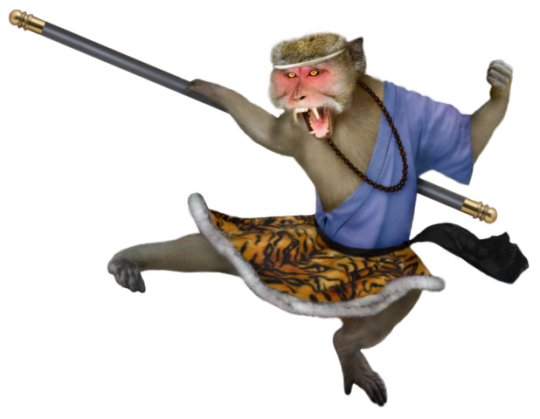
Fig. 3 – A modern depiction of Sun Wukong (larger version). A photomanipulation by the author.
After the fixed period of time has elapsed, the primordial gibbons request to leave their individual exile. The August Jade Emperor, however, refuses because of the potential for danger. Angered because heaven went back on its word, the immortal lovers leave their exile anyway, and so all of the devas, spirits, and devils struggle to keep them apart. This is an impossible task given that the two are among the highest immortals. A great battle ensues in which the pair uses their knowledge of the Dao to put the celestial army into disarray. For instance, the Ape Patriarch is a master of transformations; he grows to titanic proportions, multiplies his long arms, and captures the most powerful Daoist and Buddhist deities in his vice-like hands. The Ape Matriarch is a mistress of illusions; she clouds the minds of the soldiers, making them think they are fighting her when they are really fighting each other. [10] In addition, their individual songs have grown in power, now capable of destroying anything by separating the yin and yang forces therein (fig. 4).
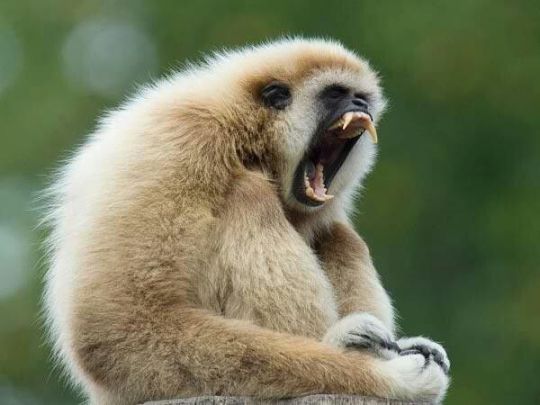
Fig. 4 - A gibbon yawning. Imagine powerful sound waves emanating from its mouth. A larger version can be found here.
The August Jade Emperor begs the Buddha to intervene like he had done for the rebelling Sun Wukong in the past. But considering that heaven went back on its word and the ape immortals are both friends and former teachers of the Enlightened One, the Tathagata sends their spiritual son, the Victorious Fighting Buddha, to ask them to pacify their rage instead of using trickery to halt the onslaught. [11] After a brief reunion, the pair acquiesces, and all three travel by cloud to the Buddha’s abode on Vulture Peak (Lingjiu shan, 靈鷲山) to discuss the matter. The immortal lovers opine the great injustice done to them by the heavenly hierarchy. The Buddha knows their duet is part of their primordial animal nature and is the ultimate expression of their love, which reaches back to the very beginning of time. Unfortunately, he realizes that the power of their song could destroy the universe if allowed to take place.
After some thought, the Tathagata gives them a lesson on the cyclical dissolution of the cosmos: at the end of each Mahakalpa (Da jie, 大劫), the universe is destroyed by a different element. There are fifty-six destructions by fire, seven by water, and one by wind. The latter is the most powerful, destroying all earthly and heavenly realms below the pure realm inhabited by the Buddha and his retinue. The Tathagata then suggests a compromise in which the couple can remain as his permanent guests of the Buddha realm, where they can frolic with the Victorious Fighting Buddha. This way the gibbons will be free to sing their melodious song without fear of negative effects. And when the end of the sixty-fourth Mahakalpa comes to a close, their song will serve the function of the wind element to bring about the dissolution of the universe to make way for the new one. [12]
Notes
1) The Chinese viewed the gibbon (Yuan, 猿) as symbolic of Confucian gentlemen and Daoist immortals. Their long arms were thought to be evidence of their expertise in soaking up qi. This resulted in long lives and occult powers (Geissmann, 2008).
2) This is based on chapter 42 of the Daodejing (道德經), the premiere holy text of Daoism. The original passage has been interpreted differently by different scholars. I’m using the interpretation presented in Laozi and Wilson, 2012, p. 197. The cited text, however, makes no mention of the Three Pure Ones. This is based on later Daoist texts and folk views on the supreme immortals. See Stevens, 1997, pp. 68-70.
3) JTTW never explains where the magical cave came from. This is my attempt to give it an origin story.
4) JTTW states the following about the boulder: “Since the creation of the world, it had been nourished for a long period by the seeds of Heaven and Earth and by the essences of the sun and moon, until, quickened by divine inspiration it became pregnant with a divine embryo” (Wu & Yu, 2012, p. 101). I’ve never been satisfied with the explanation for Monkey’s birth. Why would the rock produce a simian character? This is why I wrote that the Ape Immortals make love atop of the mountain, thereby impregnating the boulder with powerful, creative energies. In Daoist sexual practices, earth and heaven are often euphemisms for the feminine and masculine sexual energies of yin and yang (Wile, 1992, pp. 11-12 and 28-29). Therefore, what I have proposed is simply a difference in semantics.
5) Gibbon duets have an ethereal quality. Those wishing to listen to some can do so here and here (make sure your volume is not too high). It’s interesting to note that gibbons can naturally perform what takes professional opera singers years of dedicated practice to achieve (Lougheed, 2014).
6) The original mythology has the pillar being fallen by a water demon. I guess an explanation could be included somewhere that the original reason for the disaster, the gibbon song, was forgotten to time and confused with a different incident.
7) I wanted there to be a parallel between Monkey’s imprisonment and the pair’s exile, both of which are connected to mountains.
8) The Buddha’s tutelage under the gibbons happens in the distant past when he is still a Bodhisattva in the Tushita heaven. I listed Subhuti because I wanted there to be a further link between Monkey and the Ape Immortals. Therefore, the skills of Sun Wukong’s spiritual parents are transmitted to him by their former student.
9) This is based on the events in the 16th-century Chinese classic Fengshen Yanyi (封神演義), or Investiture of the Gods. In the story, chaos in heaven causes many gods to be reborn on earth as various heroes of the competing Shang and Zhou Dynasties. The King of Zhou wins the conflict and his strategist, an apprentice of the supreme immortal Yuanshi Tianzun (元始天尊), one of the Three Pure Ones, uses a magic list to deify the souls of those who died in battle. Thus, heaven is repopulated once more (Stevens, 1997, p. 60).
10) The strengths of each correspond to the skills passed on to the Buddha and the immortal Subhuti. Again, I wanted there to be a parallel between Monkey and his spiritual parents. The pair rebels like he did, but they do so because of injustice, not pride. However, I must say that lofty immortals would have surely evolved passed such earthly “wants and needs” (e.g. lust and anger). Daoist literature and vernacular Chinese fiction often describes immortals as being celibate. But the immortal love of the couple may transcend what might be expected of human-based immortals. That’s why I present them as living embodiments of yin and yang. Wile (1992) states: “The early [Daoist] texts are marked by the existential loneliness of yin and yang for each other, and their union consummates a cosmic synergy” (p. 29).
11) An example of trickery would be the way that the Buddha uses illusion to make Monkey think that he has left his palm in the seventh chapter of JTTW.
12) Buddhism recognizes a measurement of time called a Kalpa (jie, 劫), which can be many millions or even billions of years long depending on the tradition. Said traditions recognize between four and eighty kalpas (Robert & David, 2013, p. 409). The total of these respective ranges make up a Mahakalpa (dajie, 大劫), which is divided into four periods of nothingness, creation, subsistence, and finally destruction, each period being between one and twenty kalpas long (Robert & David, 2013, p. 496). For more information on the cyclical destruction of the universe by fire, water, and wind, see my article here.
Bibliography
Geissmann, T. (2008). Gibbon paintings in China, Japan, and Korea: Historical distribution, production rate and context. Gibbon Journal, 4, pp. 1-38. Received from http://www.gibbonconservation.org/07_publications/journal/gibbon_journal_4.pdf
Laozi, & Wilson, W. S. (2012). Tao te ching: An all-new translation. Boston & London: Shambhala
Lougheed, K. (2012, August 23). Helium reveals gibbon’s soprano skill. Retrieved January 20, 2014, from https://www.nature.com/news/helium-reveals-gibbon-s-soprano-skill-1.11257
Robert, E. B. J., & David, S. L. J. (2013). The Princeton Dictionary of Buddhism. Princeton, NJ: Princeton University Press.
Stevens, K. G. (1997). Chinese gods: the unseen world of spirits and demons. London: Collins & Brown.
Wile, D. (1992). Art of the bedchamber: The Chinese sexual yoga classics including women’s solo meditation texts. Albany: State University of New York Press.
Wu, C., & Yu, A. C. (2012). The journey to the West: Volume 1. Chicago, Illinois: University of Chicago Press.
#journey to the west#xiyouji#saiyuki#sun wukong#monkey king#chinese immortal#immortality#alchemy#internal alchemy#external alchemy#buddhism#esoteric buddhism#meditation#eternal love#fan fiction#prequel#great sage#great sage equaling heaven#buddha#laozi#chinese mythology#chinese literature#big bang#cosmos#universe#gibbon#monkey#ape#primate#gibbon song
13 notes
·
View notes
Note
in lmk, we are shown wukong as a strong, cheerful, smart (not always) character, but what he really is, if we talk about the original, namely jttw
ya askin whats he like in jt/tw?
hmm... lets see.
he is one of the strongest beings of the chinese folklore, he loves to smile and laugh rather than cry (he says so when Nezha accuses him of bein heartless cuz he laughed rather than grieved when they were losing against the Rhinocerous King). he is an incredibly skilled fighter- both in martial arts and thru magic/religious fate. he's charming in his own way, he's caring for those he loves (i'm holding on to my interpretation of him seeking immortality in the first place because of his love for life and his monkey family) to the point it might be sometimes honestly an issue (Tang Sanzang was... not good to him. Zhu Bajie maybe honestly even worse)
he's a simple but (always and incredibly) smart country bumpkin (compared to Heaven especially) that doesn't care about formalities and can come up with a sound plan in blink of an eye. he calls himself everyone's grandpa, cuz he's silly and loving like that. he cried over the eastern sea when he was cast away from the pilgrimage the first time and he went to mourn to Guanyin the second time he was sent away
he's a fool thats easy to rile up. he's a tad bit too self-centered, blinded by confidence in himself at times, especially so when he faced against the Buddha. he's the reason huaguo shan was burnt to the ground and that the monkeys there had to suffer for over 500 years. he still loves them so so very much
he takes no shit, ready to kill anybody who isn't important enough that stands in his way. he tries to keep his promises. he used to eat humans at some point. he isn't afraid to ask for help. he is no stranger to intimidation and bullying. he's a little oblivious to relationships- because of him Red Boy had been taken away by Guanyin to study under her as Sudhana (really, it was Red Boy's fault on like 75% though) and despite that, when he met Bull Demon King again afterwards, he thought they were still going to be on the same terms as literal centuries ago
it's hard, basically impossible, to really put him into a small characterization box because he is written to be very complex- he changes quite a bit over the course of the book, too, becoming better and better of a person. seeing as he is supposed to represent the human mind in jt/tw, a buddhistic allegory, he can be a little all over the place sometimes
LMK got him down pretty alright, i'd say!
95 notes
·
View notes
Photo

Hua Guo Shan#3 (at 花果山 HuaGuo Mountain) https://www.instagram.com/p/B28KBk6jhz2/?igshid=jelo8xlkr15m
0 notes
Note
just so you know- the "shan" in huaguo shan means "mountain" so "mt. huaguoshan" is kinda like saying "mount flowerfruit mountain"
whoops! Thanks for the heads up anon. I appreciate it.
3 notes
·
View notes
Link
So here was the godly verdict: a Liu Chen Xiang that hid away and lived and died forgotten was only proper conduct. A Liu Chen Xiang with magic was a threat to Heavenly Supremacy. Who knew. For they were not dealing with a simple mountain squatter, an expert evader of Celestial soldiers, they were dealing with euphemisms - trouble looker, dirty blood, petulant child - an avenger. For when Chen Xiang asked Sun Wukong for magic and power, what he meant was that he wanted justice.
And it was springtime and daylight when Wukong leapt to the other side of Huaguo Shan and, red staff in one hand, decree to leave him alone echoed through the place, and he promptly destroyed the woods. It was then that he realised, only then, that he had been played. That Sun Wukong had unabashedly, unadulteratedly, unmitigatedly walked into this simple trap the very same way he'd walked into Buddha's palm.
*Monkey, Sun Wukong, bends over backwards trying not to fall for the thing but lol really?*
-
So I got an AO3 solely to post Journey to the West (theres like none of ff.net) and I just updated chapter 3 and chapter 3 is some of my best work hahahahhahahaha. On ff.net I’m ‘an-earl.’ On AO3 I’m ‘an_earl.’
#journey to the west#like chapter 3 when erlang rocks up for two mins#fav part#low-key bimawen#earl writes#西游记#对不起了我的中文不够好写不出东西来。会读英文的就来吧#是西游记和宝莲灯fanfic
2 notes
·
View notes
Text
Pingshi Rudi - Cuatro durmientes
Cuatro durmientes
Pingshi Rudi, Wumeng Tane, Huaguo Ziwen (firma de las inscripciones, todos monjes Chan/Zen)
Dinastía Yuan
Antes de 1351
China
Rollo colgante, tinta sobre papel, 77,8 x 34,3 cm
Tres inscripciones
Los que duermen son Feng Gan, Han Shan y Shi De junto con un tigre. Las historias dicen que el primero de ellos montaba un tigre, y es un motivo frecuente en las pinturas pintar a estos monjes chan/zen de la dinastía Tang juntos.
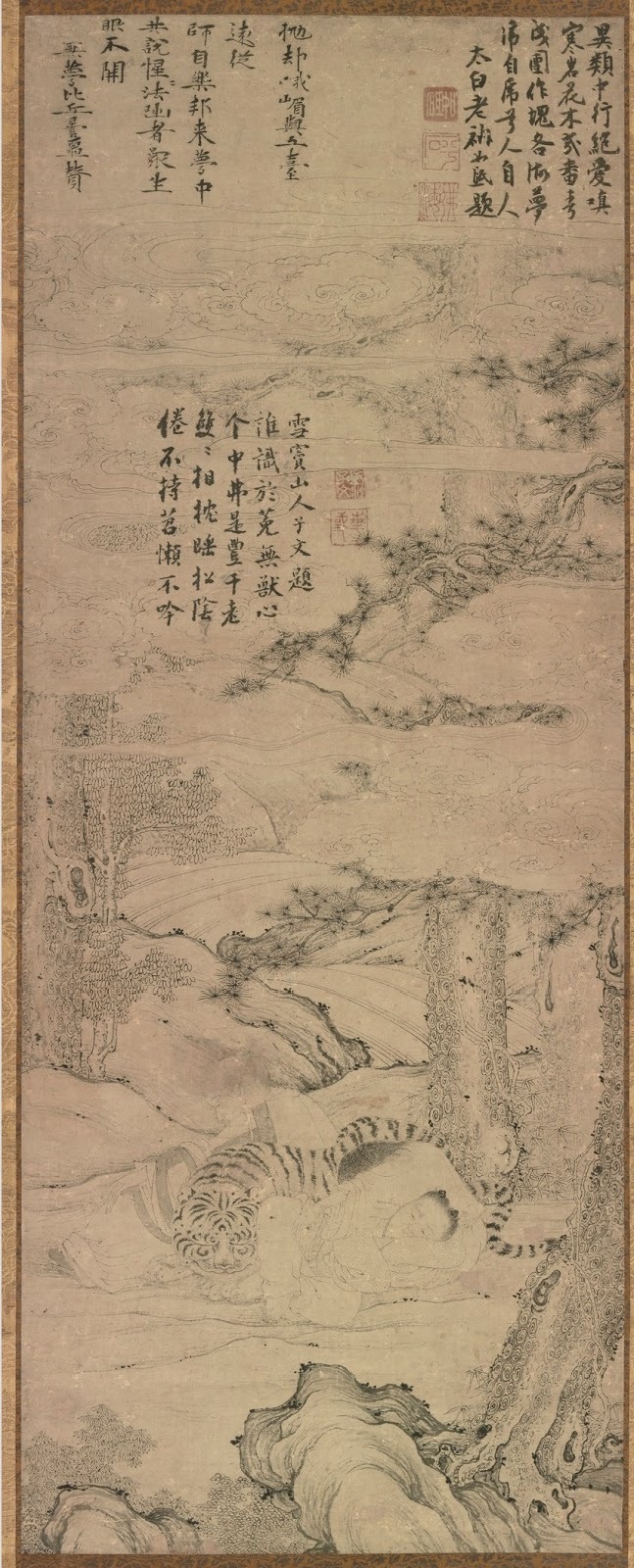
Detalle de las pinceladas de la roca y el tronco del pino:
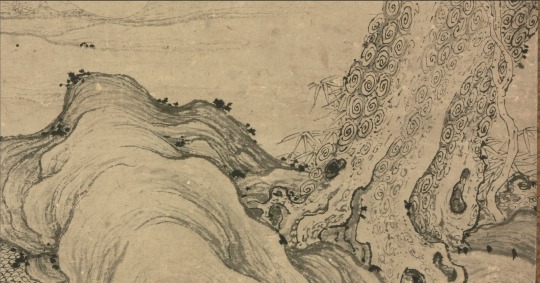
Detalle hojas de pino y nube:
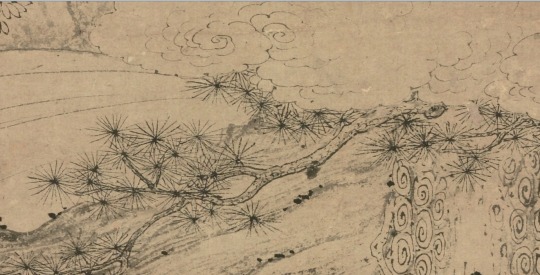
Detalle de los cuatro durmientes

emuseum.jp
0 notes